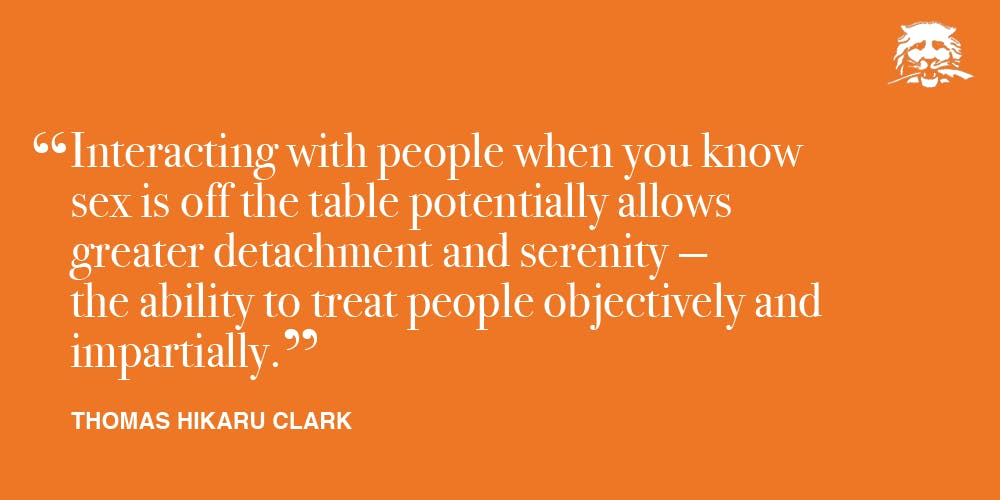What do vehement vegetarians and chastity champions have in common? Surprisingly, many people I know on campus belong to one or both of the aforementioned categories. Life at Princeton sometimes feels bloated, buoyed by an eleven-figure endowment, rife with waste and unnecessary things, overwhelmed by opportunities to pursue success and wealth. Yet I think most people don’t want to live in a world where all there is to life is ambition, self-promotion, and gratification of desires. In various forms, I have seen people embrace practices of asceticism like vegetarianism and celibacy to testify to higher values and ideals.
In a history class on late antiquity, I learned about fourth century ascetics who renounced all sexual activity, ate nothing but bread and water, and performed other feats of self-denial like living in caves or on top of pillars for decades. Indeed, throughout much of the Christian tradition, it was commonplace to refrain from eating all meat during the 40 days of Lent (which commemorate Jesus fasting for 40 days in the desert), as well as for even married couples to abstain from sex. In many other religious traditions, vegetarianism and celibacy were seen as two facets of the jewel of asceticism.
When I stayed at the Zen Buddhist temple of Eihei-ji in Japan, I saw strong similarities between the celibate, vegetarian, contemplative lifestyle of the Zen monks and the lives of St. Anthony of Egypt or Benedict of Nursia from history class.
The practices of vegetarianism and celibacy may seem unrelated except in their shared restriction of freedom and autonomy. Yet the historical motivation for both was actually to liberate the soul from enslavement to sensory pleasures. If one gets into the habit of compulsively satisfying every sexual desire and hunger craving, the logic goes, one will quickly find oneself constrained by these desires, unable to focus on more abstract or transcendent motivations, such as service to others, contemplation, or religious mysticism. Through this understanding that sensory pleasures are illusory and transient, these practices of self-discipline take on a spiritual value as an antidote to excess, greed, and selfishness.
The counterargument is often that eating meat and having sex are, from a biological and evolutionary perspective, two extremely natural activities. For millennia humans used their enhanced brainpower to outsmart and hunt other animals; everything from our teeth to our forward facing eyes to our gut bacteria is optimized to acquire and digest an omnivorous diet. As for sex, I don’t think I need to provide any evidence that sex is a part of human evolutionary history. So how did people as distant in space and time as Princeton students, Japanese monks, and Syrian hermits converge on such seemingly unnatural practices?
While the vegetarians I know avoid meat for diverse reasons like health, environment, religion, and animal cruelty, the common thread in all of these is an active choice to forsake something that is in many ways “natural” and to give moral significance to the choice of what we put into our bodies. Few people fault a lion for eating a zebra — it is just doing what lions do. Yet vegetarians have an implicit understanding that we are set apart from lions and other carnivores; we differ in that we are capable of reflecting on our actions and making choices.
Avoiding meat points to a transcendent reality, a higher plane of ethical consideration in which we are not simply biologically programmed machines that are forever destined to live out genetic proclivities. The pleasures of eating meat are widely and cheaply accessible, yet some people are willing to forget the taste of animal flesh — or never experience it — out of commitment to their ethical beliefs. The process of feeding oneself is no longer a mindless pit stop at a fuel pump — it requires awareness of where the food came from and how it was prepared. Many vegetarians and vegans choose to prepare their own food so they can do it with intentionality.
In a similar way, the people I know who choose not to be sexually active bear witness to a reality beyond what we can perceive with just the five senses. The pleasures of this world hold little value for them in comparison to the moral considerations surrounding sexuality. And while some people are saving sex for marriage, some forswear it entirely to seek a fulfillment that can’t be found in physical intimacy.

If vegetarianism changes the way you see food, celibacy changes the way you see people. Interacting with people when you know sex is off the table potentially allows greater detachment and serenity — the ability to treat people objectively and impartially, to worry less about impressing people and more about saying things that matter.
The practices of vegetarianism and celibacy are just examples; they’re not necessarily right for everyone. But I believe that some form of self-denial is necessary for everyone who wishes to see beyond the immediate and apparent. What you have doesn’t speak as much to your character as what you’ve given up.
Thomas Hikaru Clark is a senior studying computer science. He can be reached at thclark@princeton.edu.









